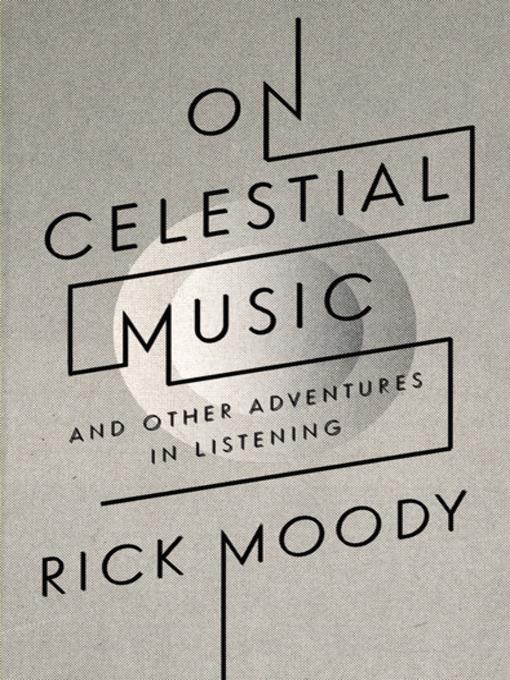
On Celestial Music
And Other Adventures in Listening
کتاب های مرتبط
- اطلاعات
- نقد و بررسی
- دیدگاه کاربران
نقد و بررسی

January 30, 2012
In this immensely rich collection of essays on music (all of which have been previously published), novelist Moody (The Ice Storm; The Four Fingers of Death) compares the pleasures we get from literature to the pleasures we get from hearing favorite pieces of music. “Literature, exactly like certain moments in song... wants openness, experiences of consciousness and sensation, and it wants these described in a way that is felicitous and sweet.” Literary effects, he points out, are “like harmonic intervals are like metrical feet are like time signatures are like cycles per second.” Moody ranges widely over different musical styles and musicians, from indie rock darlings Wilco and Jeff Tweedy and the Pogues to Pete Townshend and the Lounge Lizards. In one of the collection’s most tuneful pieces, “Against Cool,” Moody (much like Susan Sontag in her famous essay on camp) evocatively traces the evolution of the meaning of cool from Miles Davis through Kerouac and the beats and the 1960s up until the present day, where he suggests that “cool is spent; I suggest we begin to avoid cool now.” In his essay on the Christian artists Danielson Famile, he observes that they “create something closer to the sonic equivalent of the genuine difficulty of contemporary faith, because they create music that is incredibly ungainly and awkward, as faith is ungainly and awkward, though no less fervent.” Just like a good rock album, these essays were meant to be played loud.

Starred review from February 1, 2012
The acclaimed novelist shows off his considerable gifts for parsing music. Moody (The Four Fingers of Death, 2010, etc.) is also a musician of semi-pro status, with a couple of albums by his group the Wingdale Community Singers and a solo set under his belt. This collection of his writing about music for various journals is characterized by passion, inspired insight and a generous sampling of warm humor. The essays cover an astonishing amount of genre ground. Moody's catholic tastes run the gamut from rock to left-field experimental sounds, and he's a sensitive listener who almost always connects with the heart of the matter. He tackles the challenges of writing about the most fundamental of human emotions as he carves a playlist out of the Magnetic Fields' 69 Love Songs; explores the expression of spirituality in the work of the evangelistic rock group the Danielson Famile; ponders what music in Heaven might sound like in the title story, which springs off a live recording by Otis Redding; muses on the affect of the Pogues' music, viewed through the prism of lead singer Shane McGowan's alcoholism; and excoriates the soullessness of modern European pop in a tart and frequently hilarious jeremiad about the drum machine. Some chapters are less satisfying: Moody's account of two weeks at a New York music camp is essentially a journal entry, while a survey of the fin de siecle New York underground reads like exactly what it is: a chapter from an as-yet-unpublished textbook. But most of the writing is acute and intensely wrought. It's often highly personal stuff--Moody weaves his parents' divorce, his struggles with alcohol and his performance experiences into the mix--but it never succumbs to the solipsism so prevalent in much latter-day rock criticism. For Moody, music is most of all about rapture, and he communicates his feelings with an ardor and intelligence all too rare in these waning days of music criticism. Thoughtful, heartfelt and frequently moving, like the best music.
COPYRIGHT(2012) Kirkus Reviews, ALL RIGHTS RESERVED.

March 1, 2012
These mostly long and expansive essays reflect novelist Moody's love affair with music and explain just how important music has been to his writing. There is a reason, he insists, why so many writers play music. Playing music encourages you to listen more closely and makes writers more concerned with the musical component of their prose. I like music that makes other people uncomfortable, Moody admits. In an essay on what it means to be cool, he makes it clear that he never considered himself to be cool and maintains that the essence of cool is embodied in the writing of Jack Kerouac and the Beats as well as the music of punk rock. In addition, he writes about the composer and choreographer Meredith Monk, the alt-rock band Wilco, the jazz group the Lounge Lizards, Pete Townshend and the Who, two weeks spent at Music Omni, an international musician's residency program held in the Hudson Valley, and an especially insightful piece on the New York underground music scene, circa 196588. A sparking collection.(Reprinted with permission of Booklist, copyright 2012, American Library Association.)

























دیدگاه کاربران